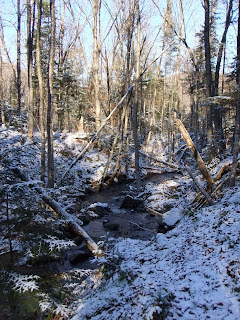Everything ends, whether it is spring, summer or fall, day or night, and the hunting season is no exception. The leaves have long dropped and the trees are all silvery sentinels, waiting for the snow to pile up deep around their bases. Most of the song birds disappeared over a month ago and the geese no longer honk up high in the sky.
My bird hunting companions have all gone back to the flat country, only my two dogs and I remain. The last day or two is usually spent in the woods alone with them, often with the intention of looking for new cover to hunt the coming year. With the barren trees it is easier to see distant ridges and hillsides than it has been any other time of the year, so I drive almost empty logging roads, stopping occasionally to poke around with my girls someplace that I’ve never been before. Somehow it just feels right.
On what I know will be the very last hunt of the year I seek out an old favorite covert though. A couple of years it’s been over on South Hill, with the snowmobile trail, abandoned orchard, and alder thicket. Once it was the alder patch on the other side of the stream from our camp, but it felt so empty, with the woodcock long gone and all of the grouse missing, that I’ve never hunted there as a last hunt again. And one year I hiked up North Hill, mostly for the views of rolling hills that seemingly stretch out forever, but found the abandoned orchards empty, as I thought I might.
Most often the last hunt is up the hill from our camp, through mixed age forest and along old grown-in skid roads, up steep country to a boxed-in basin where weeds and grass keep the forest at bay, creating a natural opening about the size of a suburban house lot. There always used to be a half dozen grouse on that hunt, but the forest is maturing and the number now is more likely to be half that. It’s the memories that keep me going back though, and on that last hunt of the year that is what I seek.
The bird seasons always seem too short, and the years so few, but there are certain places memories accumulate, like snow or leaves do in the corner by the bulkhead. One August, when we thought we’d lost our crazy Vizsla, we found her pointing a whole covey of grouse up on a rocky knoll way up that hill. In a dozen places I can still see my oldest wirehair pointing grouse, often finding birds in almost the exact same location year after year, like one particular cluster of red twig dogwood that almost always produces. Oh, there have been bumped birds and lots of missed shots, but if any of this were easy we’d soon get bored with it. So I now laugh at the follies and rejoice at the triumphs, relishing both with almost equal joy.
I remember my youngest wirehair standing next to her elder, together pointing the first grouse of that bird hunting season, which was also the youngest one’s first point on a ruffed grouse ever. Remembering their contentious retrieve, with each of them bringing me back a wing while the breast of the bird stayed where it fell, still makes me chuckle. Fortunately, since then they haven’t been as argumentative.
And somewhere along that last hunt of the season their bells will stop and I’ll walk up a partridge, and maybe we’ll get to bring it home, or maybe not. It doesn’t seem to matter as much as it used to. Hopefully it will be another memory that sticks though.
We’ll be back at the house when the shadows are gone. Whatever is left in the refrigerator will make dinner; it has to be empty and off when we leave. The dogs will be fed, probably getting some bonuses out of the collected leftovers in the fridge, and my gun will get a good cleaning, and then I’ll whittle away at the chores, things like sheets cleaned, clothes collected, and my desk packed up. And when I’ve done all I can do until morning, I’ll curl up in my favorite chair and savor a single malt along with a favorite book, until I just can’t stay awake any longer.
In the morning the heat is shut off and the water drained from the pipes. The dogs always know what is happening and stay near the stacked gear or the door, their heads down and resting on their paws. As I shuffle about closing the house up, I sometimes talk to them just because it makes me feel better. The older dog will look reserved, accepting our departure as I do, but the younger will watch in disbelief, as if to say, “Why can’t we stay here and hunt forever?”
Spring will come soon enough and we’ll be back to chase trout and listen to the grouse drumming in the woods. The way time passes, with ever increasing speed, bird season will return before we know it and we’ll again hunt. I have to wonder though how many more seasons my oldest dog will hunt, with her accumulated wisdom and white muzzle. And my years can’t go on forever either.
When the truck is packed, my girls will anxiously jump onto the back. I know they’ll soon be asleep and in dreams of hunts for the long trip home. I envy them that.




















